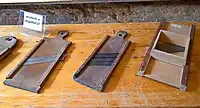Hobel
German

Krauthobel

Kantenhobel
_(2).jpg.webp)
Barthobel
Etymology
From Middle High German hovel, hobel, hubel, etc., from Old High German hovil, huobil. This is perhaps an early borrowing from Old Saxon because until the 14th century the word was chiefly Low German; compare Middle Low German hōvel. The wide variety of forms may also corroborate this. Related with Hubbel (“bump”), dialectal Hübel (“hill”), Dutch heuvel. It seems uncertain whether the noun Hobel was derived from the verb hobeln or vice versa.
Pronunciation
- IPA(key): /ˈhoːbəl/
Audio (file)
Noun
Hobel m (strong, genitive Hobels, plural Hobel)
- anything that abrades a surface, such as – particularly – a plane, a grater or slicer, a spokeshave, a safety razor
Declension
Derived terms
- Barthobel
- Doppelhobel
- Falzhobel
- Fleischhobel
- Gemüsehobel
- Glatthobel
- Grathobel
- Grundhobel
- Handhobel
- Hirnholzhobel
- Hornhauthobel
- Kantenhobel
- Käsehobel
- Kehlhobel
- Kohlenhobel
- Krauthobel
- Nuthobel
- Profilhobel
- Putzhobel
- Rasierhobel
- Schabhobel
- Schiffhobel
- Schlichthobel
- Schrupphobel
- Schweifhobel
- Simshobel
- Spätzlehobel
- Spundhobel
- Stoßhobel
- Tischhobel
- Tonhobel
- Trüffelhobel
- Vergatthobel
- Weithobel
- Zahnhobel
Related terms
This article is issued from Wiktionary. The text is licensed under Creative Commons - Attribution - Sharealike. Additional terms may apply for the media files.